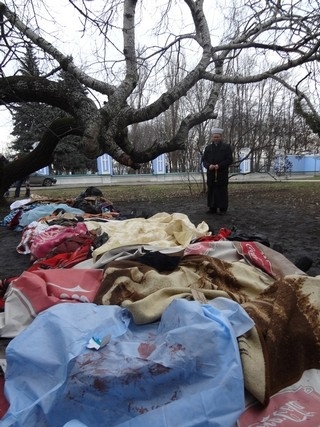"It was an awful situation. Many were dead, many injured when I arrived in the square. Some priests and I tried to identify who among the dead were Christians and Muslims so that we could perform last rites and prayers. The dead kept coming," he says. "That was the evening of February 20th. Everyone there that night said they’d never forgive the government."
Within hours 100 people were shot dead by snipers hiding in adjacent buildings and more than 160 went missing. Ukraine’s president Viktor Yanukovych fled the country but, within weeks, a war engulfed the East culminating in the shooting down of a Malaysia Airlines plane on July 17, killing all 298 people on board.
"I stayed there after they started killing people. I addressed the Ukrainian authorities, asking them to stop the shooting and to address the people," says the activist, of war-torn, occupied Donetsk in eastern Ukraine.
The 38-year-old mufti recalls one of Ukraine’s most tragic nights from his office in Kyiv’s Islamic Cultural Centre. Outside on the street, Arabic accents from Damascus to Dubai hang in the air. It’s Friday afternoon and Muslims have come to pray, catch up and shop for halal meat and Middle Eastern sweets at a street market. Ukraine has become a refuge for a small number fleeing war and unrest across the Middle East, although for Ismagilov, whose youthful appearance masks his title as the mufti of all Ukraine, his country is still very much under attack.
"When the Russian troops entered Donetsk they started intentionally killing and torturing local priests; [and] many people were subjected to mock executions," he says.
By September 2014, the mufti was a marked man in Donetsk, a city of two million people, many of whom retain close ties with Russia. When Ismagilov got word that separatists were out to capture him, he had by then become an outspoken activist, appearing many times on television, and was forced to hide in safe houses before escaping the city.
Later, when hoping to catch a glimpse of Donetsk from its outlying suburbs, a rifle round came through his car window. "The only thing that saved me was the bullet-proof vest an activist in Maidan square gave me during the revolution," he says, pointing to a photograph depicting a tiny but unmistakable chip in the windscreen.
"What we all understand is that they [the separatists] are either trying to make us part of Russia or a satellite of Russia. And what we know is that if Ukraine and Ukrainian Muslims were to come under Russian control, we would face the same problems as Muslims in other Russian territories," he says, referring to their plight in Chechnya and elsewhere. "And they have plenty of problems."
The annexation of Crimea by Russian forces in March 2014, home to 650,000 Muslim Tatars who have since openly opposed the occupation, sent more shockwaves through Ukraine’s Muslim community.
Within days, reports of hate crimes against Muslims in Crimea emerged. Dozens of Tatar men were abducted and detained while four mosques in the peninsula were set ablaze by arsonists.
A report by Human Rights Watch found that pro-Russian authorities also "conducted invasive and in some cases unwarranted searches at mosques and Islamic schools and searched dozens of private homes of Crimean Tatars".
While life for Muslims in other parts of Ukraine is less fraught, Ismagilov says the new reality on the ground in eastern Ukraine, Crimea, and also Syria and Iraq, has stretched the Islamic Cultural Centre’s resources.
In December, its charity arm handed out electric heaters to some of Ukraine’s neediest Muslims and internally-displaced persons, but helping with long-term needs such as employment and housing is beyond its reach.
The three years since the victorious, if costly, days that ostensibly drew Ukraine closer to Europe have proved anticlimactic. It remains a country mired in crisis. In November, people were outraged after the publication of records showing the wealth amassed by their new political leaders – the very people brought in to end the endemic corruption plaguing the political class.
In Maidan square recently, where protests are again expected ahead of the third anniversary of the mass shooting, the mood was sombre. Family and friends gathered in front of pictures of those killed and lit candles, while police and armed security forces ambled around.
About 10,000 people have been killed in the Ukraine conflict since fighting erupted in 2014. This week alone, at least seven Ukrainian soldiers died despite the two-year-old ceasefire.
The country remains shrouded under the shadow of its giant neighbour to the north. Ismagilov, however, sees no other option than to remain defiant.
"I was elected to represent the people," he says. "Whether that takes me back into the streets or not, I’m ready."
Source: The National Arts and Life



